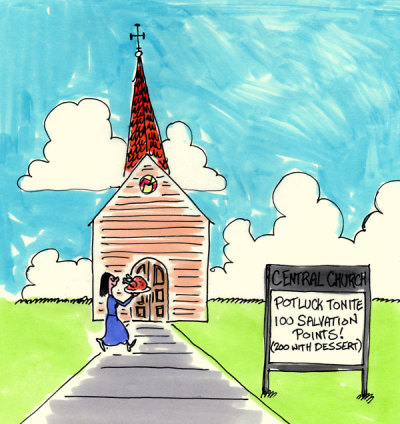Does the book of James promote salvation by works?

A verse in the Bible seems at first blush to be at odds with the biblical doctrine of justification by faith. The atypical sentence in question was written by James.
“You see that a person is justified by what he does and not by faith alone” (James 2:24).
Does James teach that salvation can be earned? And if so, can one verse possibly overturn hundreds of verses that clearly teach that man is justified by faith?
In order to understand James 2:24, we must interpret it in the context of the entire New Testament, and also in the context of the book of James. There are almost 8,000 verses in the New Testament, consisting of roughly 138,000 words.
Here is one way to think about that enormous number of words.
Imagine a young woman writing a 276-page letter (500 words per page) to her fiancé filled with hundreds of expressions of unconditional love and affection. What if one sentence in the letter seemed to contradict everything else she had written? You would need to interpret that sentence in light of the entire 276-page letter.
When seeking to understand Christianity, it is critical that we allow Scripture to interpret Scripture. We cannot cherry-pick individual verses, thereby creating doctrines that are inconsistent with the rest of Scripture.
The Bible is God’s love letter to His children. The New Testament reveals that believers in Jesus are justified on the front end of their relationship with God. Justification is not a process. It is complete the moment a soul is converted by the power of the Holy Spirit (John 3:6).
The Apostle Paul wrote, “God justifies the man who has faith in Jesus … for we maintain that a man is justified by faith apart from observing the Law” (Romans 3:26,28).
“Therefore, since we have been justified through faith, we have peace with God through our Lord Jesus Christ, through whom we have gained access by faith into this grace in which we now stand” (Romans 5:1,2).
Notice that the verb “justified” is in the past tense. “We have been justified through faith.” This is true for every Christian. Justification is complete the moment a believer trusts Jesus for salvation.
“Since we have now been justified by Christ's blood, how much more shall we be saved from God’s wrath through Him!” (Romans 5:9) Here again, “justified” is in the past tense.
Paul wrote, “A man is not justified by observing the Law, but by faith in Jesus Christ” (Gal. 2:16). “Clearly no one is justified before God by the Law, because, ’The righteous will live by faith’” (Gal. 3:11).
It is crucial that we do not redefine “faith” in an attempt to build a works-based system of salvation. The biblical definition of faith is simply: “trust, firm persuasion; a conviction based upon hearing.” Faith involves believing something; works involve doing something.
What does Scripture say about those who rely upon their works for salvation? “All who rely on observing the Law are under a curse” (Gal. 3:10).
A believer is forgiven, saved, justified, born again, and redeemed on the front end of his relationship with God. “For it is by grace you have been saved, through faith – and this not from yourselves, it is the gift of God – not by works, so that no one can boast” (Eph. 2:8,9).
If our works could earn us eternal life in Heaven, there would have been no need for the sinless Son of God to be sacrificed on the cross for our sins. Paul wrote, “I do not set aside the grace of God, for if righteousness could be gained through the Law, Christ died for nothing!” (Gal. 2:21).
Paul frequently elucidated the theological distinction between justification and sanctification. Justification is like the concrete foundation for a house. Once the foundation is laid, the house can be built. Faith in Christ provides the foundation, while our good works are the materials God uses to build the house of sanctification.
“God works in you to will and to act according to His good purpose” (Philippians 2:13).
Justification occurs at the moment of conversion through a living faith that has yet to produce even one good work. Did you catch that? Believers are forgiven of their sins and made alive with Christ before they do their first good work.
“God made us alive with Christ even when we were dead in transgressions – it is by grace you have been saved” (Eph. 2:5).
Dead souls have dead faith and dead works, whereas those alive in Christ have a living faith that produces good works that please God.
James was concerned about those whose so-called “faith” was not alive. “Faith without works is dead” (James 2:26).
As a believer, you were converted when you trusted Christ to forgive your sins. The Holy Spirit entered into your life at that moment (1 Cor. 6:19).
Paul wrote to folks in Galatia who had become very confused about their conversion and about justification by faith:
“You foolish Galatians! Who has bewitched you?... Did you receive the Spirit by observing the Law, or by believing what you heard? Are you so foolish? After beginning with the Spirit, are you now trying to attain your goal by human effort?” (Gal. 3:1-3).
Paul presented a systematic explanation of Christianity and the Christian life. James, on the other hand, was interested in comparing “dead faith” to biblical faith. James wanted his readers to know that Christian faith is a living thing, and it results in good works.
But this does not mean that man is justified by his works. Quite the contrary. Good works do not add an ounce of concrete to the foundation of justification by faith.
After all, “No one can lay any foundation other than the one already laid, which is Jesus Christ” (1 Cor. 3:11).
While James did not teach that salvation can be earned, he did teach that good works are the fruit of a living faith in Jesus Christ.
Dan Delzell is the pastor of Redeemer Lutheran Church in Papillion, Nebraska.



























